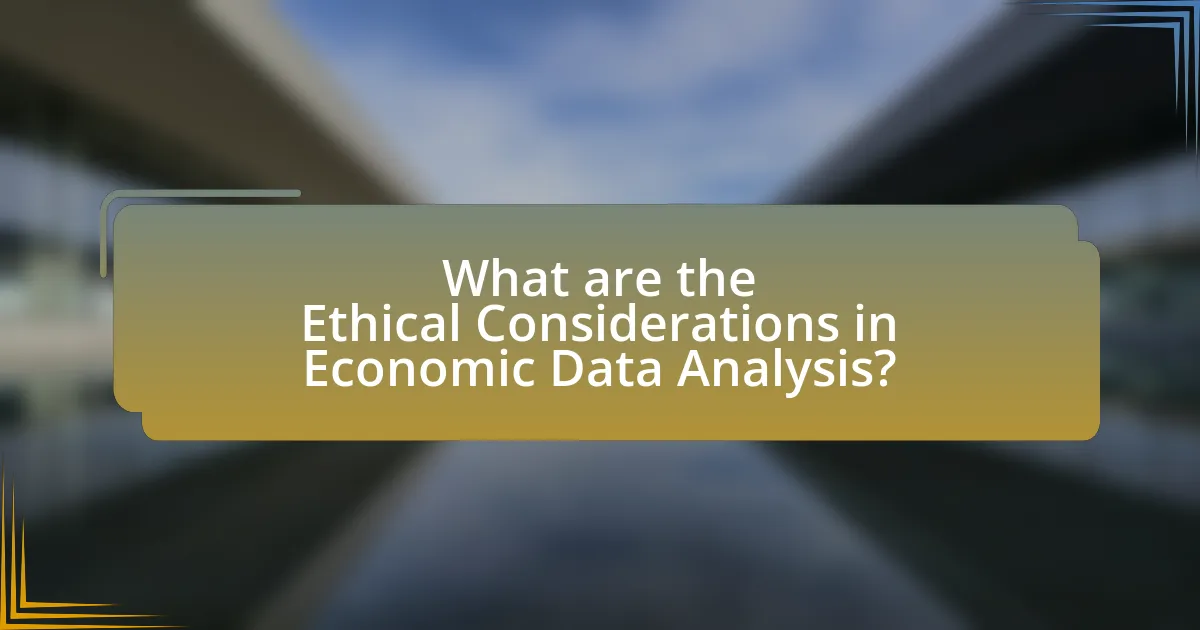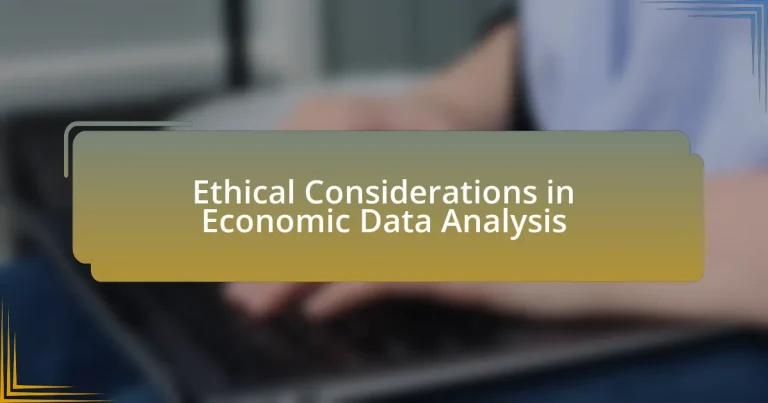The article focuses on ethical considerations in economic data analysis, emphasizing the importance of data privacy, informed consent, and the potential for bias in data interpretation. It outlines the principles guiding ethical analysis, including transparency, integrity, respect for privacy, and accountability, while discussing common ethical dilemmas and their implications for public policy decisions. The article also highlights the significance of adhering to ethical standards to enhance the credibility of economic research and the potential legal repercussions of unethical practices. Additionally, it provides practical strategies for analysts to maintain ethical integrity in their work and navigate conflicts of interest.

What are the Ethical Considerations in Economic Data Analysis?
Ethical considerations in economic data analysis include issues of data privacy, informed consent, and the potential for bias in data interpretation. Data privacy is crucial as analysts must ensure that personal information is protected and used responsibly, adhering to regulations such as the General Data Protection Regulation (GDPR). Informed consent is necessary when collecting data from individuals, ensuring they understand how their information will be used. Additionally, bias can arise from the selection of data sources or the framing of questions, which can lead to misleading conclusions. For instance, a study published in the Journal of Economic Perspectives highlights how biased data can skew economic policy recommendations, emphasizing the importance of ethical rigor in data analysis.
Why is ethics important in economic data analysis?
Ethics is crucial in economic data analysis because it ensures the integrity and reliability of the findings derived from data. Ethical practices prevent manipulation or misrepresentation of data, which can lead to misleading conclusions that affect policy decisions and public trust. For instance, the American Economic Association emphasizes the importance of ethical standards in research to maintain credibility and accountability in economic analysis. Adhering to ethical guidelines fosters transparency, protects the rights of individuals involved in data collection, and promotes responsible use of data, ultimately contributing to more accurate and equitable economic outcomes.
What ethical dilemmas commonly arise in economic data analysis?
Ethical dilemmas in economic data analysis commonly include issues of data privacy, informed consent, and potential biases in data interpretation. Data privacy concerns arise when sensitive information is collected and analyzed without adequate safeguards, potentially exposing individuals to risks. Informed consent is critical, as analysts must ensure that participants understand how their data will be used, which is often overlooked in large datasets. Additionally, biases can emerge from the selection of data or the interpretation of results, leading to misleading conclusions that can affect policy decisions and public perception. For instance, a study by the American Economic Association highlights that biased data analysis can perpetuate inequalities, emphasizing the need for ethical standards in economic research.
How do ethical considerations impact data interpretation?
Ethical considerations significantly impact data interpretation by guiding the integrity and accuracy of the analysis. When researchers prioritize ethical standards, they ensure that data is collected, analyzed, and presented transparently, which fosters trust and credibility in the findings. For instance, ethical guidelines require that data is not manipulated or misrepresented, which can lead to misleading conclusions and potentially harmful consequences for stakeholders. Furthermore, adherence to ethical norms, such as respecting privacy and obtaining informed consent, influences how data is contextualized and understood, ultimately shaping policy decisions and public perception.
What principles guide ethical economic data analysis?
The principles that guide ethical economic data analysis include transparency, integrity, respect for privacy, and accountability. Transparency ensures that data sources, methodologies, and findings are openly shared, allowing for scrutiny and validation. Integrity involves maintaining accuracy and honesty in data representation, avoiding manipulation or misinterpretation. Respect for privacy mandates that individual data is anonymized and handled in compliance with legal and ethical standards, protecting personal information. Accountability requires analysts to take responsibility for their work and its implications, ensuring that analyses are conducted with consideration of their potential impact on society. These principles are essential for fostering trust and credibility in economic research and analysis.
How do transparency and accountability play a role in ethical analysis?
Transparency and accountability are essential components of ethical analysis as they ensure that decision-making processes are open to scrutiny and that individuals or organizations are held responsible for their actions. Transparency allows stakeholders to access information regarding methodologies, data sources, and analytical processes, which fosters trust and enables informed critique. Accountability ensures that those involved in ethical analysis are answerable for their decisions and the implications of their findings, thereby promoting integrity and ethical standards. For instance, the 2015 report by the International Monetary Fund emphasizes that transparent reporting of economic data enhances credibility and public trust, which is crucial for effective governance and ethical economic analysis.
What is the significance of informed consent in data collection?
Informed consent is significant in data collection as it ensures that participants are fully aware of how their data will be used, promoting ethical standards and protecting individual autonomy. This process fosters trust between researchers and participants, as it requires clear communication about the purpose, risks, and benefits of the study. Furthermore, informed consent is a legal requirement in many jurisdictions, reinforcing the ethical obligation to respect participants’ rights. Studies, such as those published in the Journal of Medical Ethics, highlight that obtaining informed consent can lead to more reliable data, as participants who understand the research context are more likely to engage honestly and thoughtfully.
What are the consequences of unethical practices in economic data analysis?
Unethical practices in economic data analysis lead to significant consequences, including distorted policy decisions and loss of public trust. When data is manipulated or misrepresented, it can result in misguided economic policies that adversely affect communities and economies. For instance, the 2008 financial crisis was partly attributed to misleading economic data that obscured the true risk levels in financial markets. Additionally, unethical practices can lead to legal repercussions for organizations, as seen in cases where companies faced lawsuits for fraudulent reporting. Ultimately, these consequences undermine the integrity of economic research and can have long-lasting effects on societal welfare.
How can unethical data analysis affect public policy decisions?
Unethical data analysis can significantly distort public policy decisions by leading to misguided conclusions and ineffective policies. When data is manipulated or misrepresented, it can create a false narrative that influences policymakers to allocate resources improperly or prioritize issues based on inaccurate information. For instance, a study by the National Bureau of Economic Research found that biased data interpretations can result in policies that exacerbate social inequalities, as seen in the misallocation of funds in education and healthcare sectors. This demonstrates that unethical practices not only undermine the integrity of data but also have real-world consequences on societal welfare and governance.
What are the potential legal repercussions of unethical practices?
Unethical practices can lead to severe legal repercussions, including civil lawsuits, criminal charges, and regulatory penalties. For instance, companies engaging in fraudulent activities may face lawsuits from affected parties, resulting in significant financial damages. Additionally, individuals involved in unethical behavior may be subject to criminal prosecution, which can lead to fines and imprisonment. Regulatory bodies, such as the Securities and Exchange Commission (SEC), impose penalties on organizations that violate ethical standards, which can include hefty fines and restrictions on business operations. These legal consequences serve as a deterrent against unethical practices in economic data analysis and other fields.
How can researchers ensure ethical standards in economic data analysis?
Researchers can ensure ethical standards in economic data analysis by adhering to established guidelines for data collection, analysis, and reporting. This includes obtaining informed consent from participants, ensuring data privacy and confidentiality, and using transparent methodologies. For instance, the American Economic Association’s Code of Ethics emphasizes the importance of honesty and integrity in research practices, which reinforces the need for ethical considerations. Additionally, researchers should engage in peer review and seek feedback from ethical review boards to validate their approaches and findings.
What best practices should be followed for ethical data collection?
Best practices for ethical data collection include obtaining informed consent, ensuring data privacy, and minimizing data collection to what is necessary. Informed consent requires that participants are fully aware of how their data will be used and have the option to opt out. Ensuring data privacy involves implementing measures to protect personal information from unauthorized access, which is supported by regulations such as the General Data Protection Regulation (GDPR) that mandates strict data handling protocols. Minimizing data collection aligns with the principle of data minimization, which states that only the data necessary for a specific purpose should be collected, thereby reducing potential risks associated with data misuse.
How can data analysts maintain integrity in their findings?
Data analysts can maintain integrity in their findings by adhering to ethical guidelines, ensuring transparency, and validating their data sources. Ethical guidelines, such as those outlined by the American Statistical Association, emphasize the importance of honesty and accuracy in reporting results. Transparency involves clearly documenting methodologies and data sources, allowing others to replicate findings and verify results. Additionally, validating data sources through cross-referencing with reputable databases or peer-reviewed studies enhances the credibility of the analysis. For instance, a study published in the Journal of Economic Perspectives highlights that rigorous validation processes significantly reduce the risk of errors and biases in economic data analysis.

What role does data privacy play in ethical economic data analysis?
Data privacy is crucial in ethical economic data analysis as it ensures the protection of individuals’ personal information and fosters trust in data-driven research. By adhering to data privacy regulations, such as the General Data Protection Regulation (GDPR), analysts can prevent misuse of sensitive information, thereby upholding ethical standards. For instance, a study by the International Association of Privacy Professionals highlights that organizations prioritizing data privacy not only comply with legal requirements but also enhance their reputation and stakeholder confidence. This demonstrates that data privacy is not merely a legal obligation but a foundational element of ethical economic analysis, ensuring that data is used responsibly and transparently.
Why is data privacy crucial in economic research?
Data privacy is crucial in economic research because it protects individuals’ sensitive information and maintains trust in the research process. When researchers handle personal data, they must ensure that it is anonymized and secured to prevent misuse or unauthorized access, as breaches can lead to significant harm to individuals and damage the credibility of the research community. For instance, the General Data Protection Regulation (GDPR) in Europe mandates strict guidelines for data handling, emphasizing the importance of consent and transparency, which reinforces the ethical obligation to safeguard personal data in economic studies.
What are the risks associated with data breaches in economic analysis?
Data breaches in economic analysis pose significant risks, including the compromise of sensitive financial data, loss of consumer trust, and potential legal repercussions. When economic data is breached, it can lead to unauthorized access to proprietary information, which may result in financial losses for organizations and individuals. Additionally, the exposure of personal data can damage the reputation of firms involved in economic analysis, leading to a decline in customer confidence and loyalty. Legal risks arise from non-compliance with data protection regulations, such as the General Data Protection Regulation (GDPR), which can result in hefty fines and sanctions. These risks highlight the critical importance of implementing robust data security measures in economic analysis to protect sensitive information and maintain ethical standards.
How can analysts protect sensitive information during analysis?
Analysts can protect sensitive information during analysis by implementing data encryption, access controls, and anonymization techniques. Data encryption ensures that sensitive information is encoded and can only be accessed by authorized users, thereby preventing unauthorized access. Access controls limit who can view or manipulate the data, ensuring that only individuals with the necessary permissions can interact with sensitive information. Anonymization techniques, such as removing personally identifiable information, help to protect individual identities while still allowing for meaningful analysis. These methods are supported by best practices in data security, which emphasize the importance of safeguarding sensitive information to maintain privacy and comply with regulations such as GDPR and HIPAA.
What regulations govern data privacy in economic research?
Regulations governing data privacy in economic research primarily include the General Data Protection Regulation (GDPR) in the European Union and the Health Insurance Portability and Accountability Act (HIPAA) in the United States. GDPR mandates strict guidelines for data collection, processing, and storage, ensuring individuals’ rights to privacy and data protection. HIPAA, while focused on health data, also impacts economic research involving health-related information by enforcing confidentiality and security measures. These regulations are designed to protect personal data and ensure ethical standards in research practices, thereby promoting trust and integrity in economic analysis.
How do GDPR and other regulations impact economic data analysis?
GDPR and other regulations significantly restrict the use of personal data in economic data analysis, requiring organizations to ensure data privacy and protection. These regulations mandate that data must be collected and processed lawfully, transparently, and for specific purposes, which limits the scope of data available for analysis. For instance, under GDPR, individuals have the right to access their data, request corrections, and demand deletion, which can lead to incomplete datasets and hinder comprehensive economic analysis. Additionally, non-compliance with these regulations can result in substantial fines, as seen in 2021 when Amazon was fined €746 million for GDPR violations, emphasizing the financial risks associated with inadequate data governance.
What are the implications of non-compliance with data privacy laws?
Non-compliance with data privacy laws can lead to significant legal and financial repercussions for organizations. Entities that fail to adhere to regulations such as the General Data Protection Regulation (GDPR) may face fines up to 4% of their annual global revenue or €20 million, whichever is higher. Additionally, non-compliance can result in reputational damage, loss of customer trust, and potential lawsuits from affected individuals. For instance, in 2021, British Airways was fined £20 million for a data breach that compromised personal information of over 400,000 customers, illustrating the severe financial impact of failing to protect data privacy.

How can ethical considerations enhance the credibility of economic data analysis?
Ethical considerations enhance the credibility of economic data analysis by ensuring transparency, integrity, and accountability in the research process. When researchers adhere to ethical standards, they minimize biases and misrepresentation, which fosters trust among stakeholders. For instance, the American Economic Association emphasizes the importance of ethical guidelines in promoting honest reporting and avoiding conflicts of interest, which can distort findings. Furthermore, studies have shown that ethical practices in data collection and analysis lead to more reliable results, as seen in the replication crisis in economics, where unethical practices contributed to the inability to reproduce significant findings. Thus, ethical considerations are crucial for maintaining the validity and reliability of economic data analysis.
What are the benefits of adhering to ethical standards in analysis?
Adhering to ethical standards in analysis enhances the credibility and reliability of research findings. Ethical practices ensure that data is collected, analyzed, and reported transparently, which fosters trust among stakeholders, including researchers, participants, and the public. For instance, studies have shown that ethical adherence can lead to more accurate data interpretation and better decision-making, as seen in the American Psychological Association’s guidelines, which emphasize integrity and respect for participants. Furthermore, ethical standards help prevent misconduct, such as data manipulation, thereby safeguarding the integrity of the research process and its outcomes.
How does ethical analysis contribute to trust in economic research?
Ethical analysis contributes to trust in economic research by ensuring transparency, integrity, and accountability in the research process. When researchers adhere to ethical standards, they minimize biases and conflicts of interest, which enhances the credibility of their findings. For instance, studies that disclose funding sources and potential conflicts allow stakeholders to assess the reliability of the results. Furthermore, ethical analysis promotes the responsible use of data, ensuring that research is conducted with respect for participants and communities, thereby fostering public confidence in the research outcomes. This trust is critical, as it influences policy decisions and public perception of economic research.
What role does peer review play in ensuring ethical standards?
Peer review plays a critical role in ensuring ethical standards by providing a systematic evaluation of research before publication. This process involves experts in the field assessing the validity, significance, and originality of the work, which helps to identify potential ethical issues such as data manipulation, plagiarism, or conflicts of interest. Studies have shown that peer-reviewed articles are more likely to adhere to ethical guidelines, as the scrutiny from peers acts as a safeguard against unethical practices. For instance, a review published in the journal “Nature” highlighted that peer review can enhance the integrity of research by fostering accountability among authors and ensuring that ethical standards are upheld throughout the research process.
What practical steps can analysts take to uphold ethical standards?
Analysts can uphold ethical standards by implementing a robust framework for data integrity and transparency. This includes ensuring accurate data collection methods, maintaining confidentiality of sensitive information, and adhering to established ethical guidelines such as those set by the American Economic Association. For instance, analysts should regularly audit their data sources and methodologies to prevent biases and inaccuracies, which is crucial for maintaining public trust and credibility in their findings. Additionally, engaging in continuous education about ethical practices in data analysis helps analysts stay informed about evolving standards and best practices.
How can continuous education on ethics improve data analysis practices?
Continuous education on ethics can significantly enhance data analysis practices by ensuring analysts are aware of ethical standards and implications of their work. This ongoing training helps analysts recognize biases, understand data privacy laws, and apply ethical frameworks, which leads to more responsible data handling and interpretation. For instance, a study by the Data Ethics Commission in Germany highlighted that organizations with robust ethics training programs reported a 30% decrease in data misuse incidents. By fostering a culture of ethical awareness, continuous education empowers data analysts to make informed decisions that align with ethical guidelines, ultimately improving the integrity and reliability of their analyses.
What resources are available for ethical guidelines in economic data analysis?
Resources available for ethical guidelines in economic data analysis include the American Economic Association’s (AEA) Code of Ethics, which outlines principles for ethical research conduct. Additionally, the International Statistical Institute (ISI) provides guidelines on ethical statistical practices, emphasizing transparency and integrity in data handling. The European Union’s General Data Protection Regulation (GDPR) also serves as a crucial legal framework, ensuring the protection of personal data in economic research. These resources collectively establish standards for ethical behavior in the analysis and reporting of economic data.
What are common challenges faced in maintaining ethical standards?
Common challenges faced in maintaining ethical standards include conflicts of interest, data privacy concerns, and the pressure to achieve results. Conflicts of interest arise when personal or financial interests interfere with professional judgment, leading to biased outcomes. Data privacy concerns are significant, especially when handling sensitive information, as breaches can violate ethical guidelines and legal regulations. Additionally, the pressure to achieve results can lead individuals to compromise ethical standards in favor of expediency or success, undermining the integrity of the analysis. These challenges are documented in various studies, such as the “Ethics in Economic Research” report by the American Economic Association, which highlights the importance of adhering to ethical principles in data analysis.
How can analysts navigate conflicts of interest in their work?
Analysts can navigate conflicts of interest in their work by implementing strict ethical guidelines and transparency measures. Establishing a clear code of ethics that outlines acceptable practices helps analysts identify potential conflicts early. Regular training on ethical standards and the importance of impartiality reinforces these guidelines. Additionally, disclosing any personal or financial interests related to their analysis ensures transparency, allowing stakeholders to assess the integrity of the findings. Research indicates that organizations with robust conflict of interest policies experience fewer ethical breaches, highlighting the effectiveness of these measures in maintaining trust and credibility in economic data analysis.
What strategies can be employed to address ethical dilemmas in practice?
To address ethical dilemmas in practice, organizations can implement a framework that includes ethical guidelines, stakeholder engagement, and continuous training. Establishing clear ethical guidelines helps define acceptable behavior and decision-making processes, ensuring that all team members understand the ethical standards expected of them. Engaging stakeholders, including clients and affected communities, fosters transparency and accountability, allowing for diverse perspectives to inform ethical considerations. Continuous training on ethical practices equips employees with the tools to navigate complex situations, reinforcing the importance of ethics in decision-making. Research indicates that organizations with strong ethical frameworks experience fewer ethical breaches and improved trust among stakeholders, highlighting the effectiveness of these strategies in practice.


